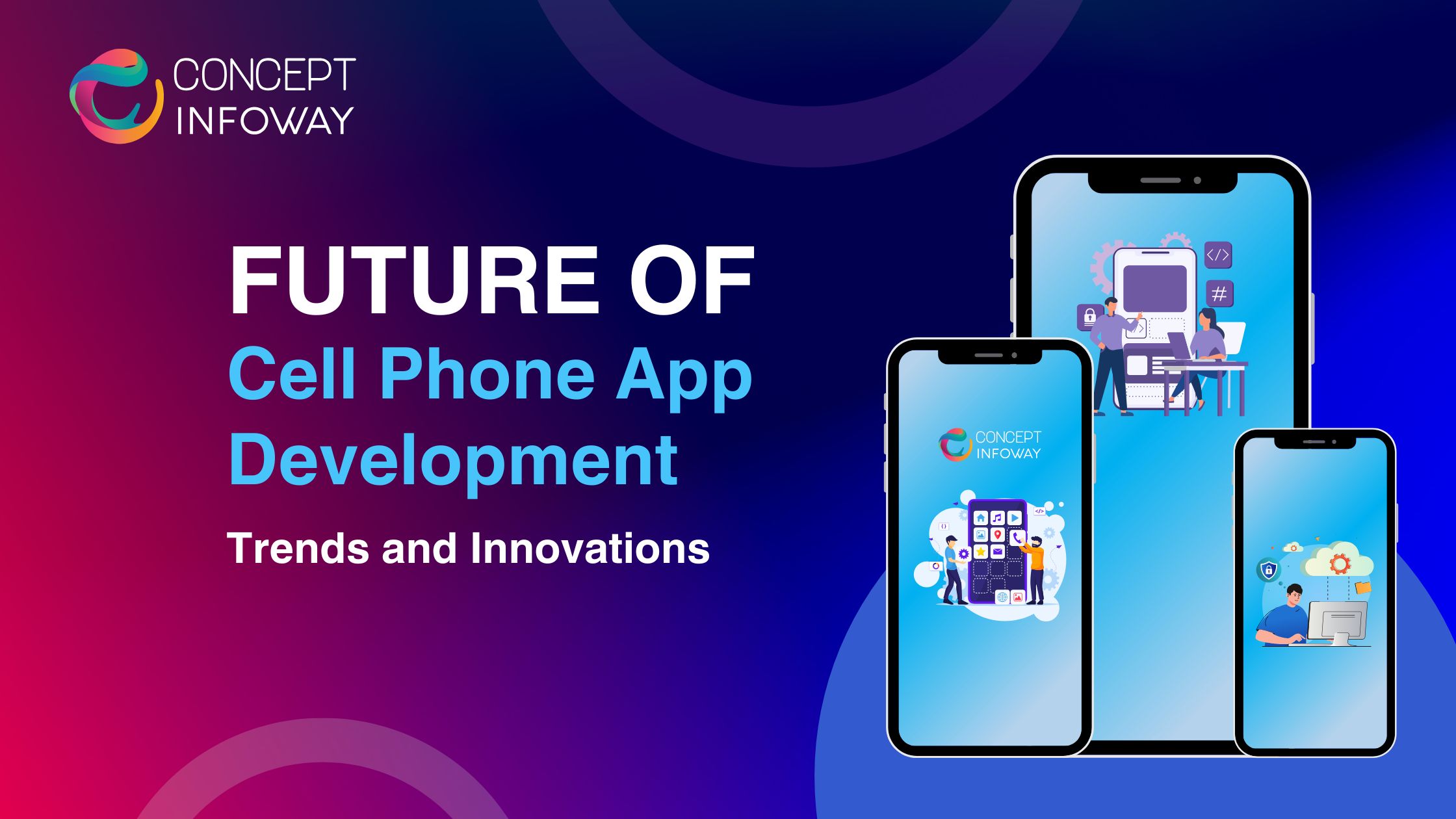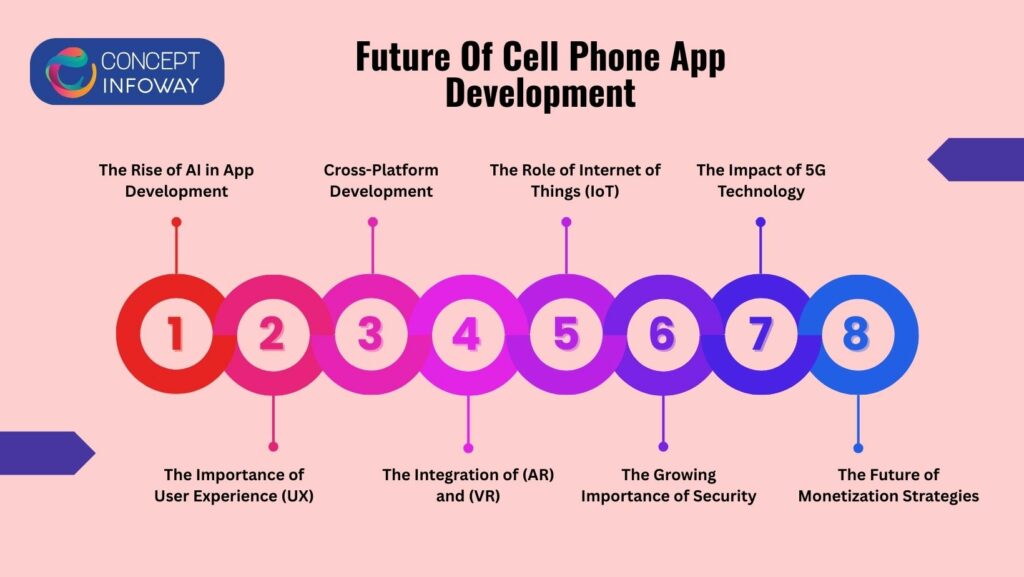
Future of Cell Phone App Development: Trends and Innovations
Cell phone app development is changing fast due to new technology and changing user needs. Cell phone app developers are using fresh ideas and simpler tools to create apps that are fun, secure, and easy to use. Innovations such as artificial intelligence and augmented reality help make apps smarter and more interactive. Many developers now design apps that work well on different devices, reducing the time spent on updates and repairs. This simple approach not only improves user experience but also makes apps more reliable and safer by protecting personal information.
As trends continue to evolve, developers keep learning and adapting to offer the best solutions. This article explains how these changes are shaping the future of cell phone app development. It provides clear insights for anyone interested in technology and the art of app creation, showing that even complex ideas can be made simple and enjoyable.
The Rise of Artificial Intelligence in App Development
AI-Powered Applications
Artificial Intelligence (AI) is no longer just a buzzword; it’s a reality that is transforming cell phone app development. AI-powered applications are becoming increasingly popular, offering personalized experiences to users. From chatbots that provide customer support to recommendation systems that suggest products based on user behaviour, AI is enhancing the functionality of mobile apps.
Machine Learning and Predictive Analytics
Cell phone app developers are leveraging machine learning algorithms to analyse user data and predict future behaviour. This capability allows developers to create apps that can adapt to user preferences, making them more engaging and efficient. For instance, fitness apps can analyse a user’s activity patterns and suggest personalized workout plans, while shopping apps can recommend products based on past purchases.
The Importance of User Experience (UX)
Designing for the User
In the realm of cell phone app development, user experience (UX) is paramount. A well-designed app can make or break its success. As we look to the future, the focus on UX will only intensify. Developers will need to prioritize intuitive navigation, appealing aesthetics, and seamless interactions to keep users engaged.
The Role of User Feedback
User feedback is a goldmine for cell phone app developers. By actively seeking and incorporating user suggestions, developers can create apps that truly meet the needs of their audience. This iterative process not only improves the app but also fosters a sense of community among users, making them feel valued and heard.
The Shift Towards Cross-Platform Development
One Codebase, Multiple Platforms
Traditionally, app development required separate codebases for iOS and Android. However, the future of cell phone app development is leaning towards cross-platform solutions. Frameworks like React Native and Flutter allow developers to write code once and deploy it on multiple platforms, saving time and resources.
Benefits of Cross-Platform Development
Cross-platform development offers several advantages. It reduces development costs, accelerates time-to-market, and ensures a consistent user experience across devices. As more businesses recognize these benefits, the demand for cross-platform solutions will continue to grow, shaping the future landscape of app development.
The Integration of Augmented Reality (AR) and Virtual Reality (VR)
Immersive Experiences
Augmented Reality (AR) and Virtual Reality (VR) are no longer confined to gaming; they are making their way into mainstream cell phone app development. These technologies offer immersive experiences that can enhance various applications, from education to retail.
Real-World Applications of AR and VR
For instance, AR can be used in shopping apps to allow users to visualize how furniture would look in their homes before making a purchase. Similarly, VR can be utilized in educational apps to create interactive learning environments. As AR and VR technologies continue to advance, we can expect to see even more innovative applications in the future.
The Role of Internet of Things (IoT)
Connecting Devices
The Internet of Things (IoT) is revolutionizing the way we interact with technology. In the context of cell phone app development, IoT enables apps to connect and control various devices, creating a seamless user experience.
Smart Home Integration
Imagine controlling your home’s lighting, thermostat, and security system all from a single app on your phone. This is the future that IoT promises. Cell phone app developers are increasingly focusing on creating applications that can integrate with smart home devices, allowing users to manage their environments effortlessly.
Want to Build the Next Big App?
Contact Us Now!The Growing Importance of Security
Protecting User Data
As the number of mobile applications increases, so does the need for robust security measures. The future of cell phone app development will see a heightened focus on protecting user data. Developers will need to implement advanced security protocols to safeguard sensitive information and build trust with their users.
Biometric Authentication
One of the most promising trends in app security is the use of biometric authentication. Features like fingerprint scanning and facial recognition are becoming standard in many applications, providing an extra layer of security. As users become more aware of privacy concerns, the demand for secure apps will continue to rise.
The Impact of 5G Technology
Faster Connectivity
The rollout of 5G technology is set to revolutionize cell phone app development. With faster download speeds and lower latency, developers will have the opportunity to create more complex and data-intensive applications.
Enhanced User Experiences
5G will enable real-time data processing, allowing for smoother streaming, quicker downloads, and improved overall performance. This advancement will open new doors for app developers, particularly in areas like gaming, video conferencing, and augmented reality.
The Future of Monetization Strategies
Evolving Business Models
As the app market becomes increasingly saturated, cell phone app developers will need to explore innovative monetization strategies. Traditional models like in-app purchases and subscriptions will continue to be popular, but new approaches will emerge.
Ad-Based Revenue Models
Ad-based revenue models are gaining traction, especially for free apps. Developers can partner with advertisers to display targeted ads within their applications, generating income while providing users with free access. As user preferences evolve, finding the right balance between monetization and user experience will be crucial.
What is the Future of Cell Phone App Development?
The future of cell phone app development is set to be defined by groundbreaking technologies and innovations that will transform how apps interact with users. With the rapid advancements in AI, machine learning, 5G, and augmented reality (AR), the development landscape is evolving to deliver more personalized, efficient, and immersive experiences. Cell phone app developers are now focusing on creating smarter, faster, and more secure apps, while also embracing cross-platform development to streamline the creation process. The integration of wearable devices and IoT technology will also play a pivotal role, connecting users with a more interconnected and data-driven world.
Conclusion
The future of cell phone app development is bright, filled with exciting trends and innovations that promise to enhance user experiences and streamline development processes. From the integration of AI and IoT to the rise of cross-platform solutions and the impact of 5G technology, the landscape is constantly changing.
As we move forward, cell phone app developers must stay ahead of the curve, embracing new technologies and methodologies to create applications that not only meet user needs but also exceed their expectations. By focusing on user experience, security, and innovative monetization strategies, developers can ensure their apps thrive in an increasingly competitive market.
In summary, the future of cell phone app development is not just about creating applications; it’s about crafting experiences that resonate with users and adapt to their evolving needs. As technology continues to advance, the possibilities are endless, and the journey of app development is just beginning.
Ready to build cutting-edge mobile applications? Contact Concept Infoway LLC, a leading cell phone app development company, today and start creating innovative, high-performance apps that will drive success in the ever-evolving tech industry.
Call Us Today!
+1 832 290 9522Frequently Asked Questions – FAQs
Cell phone app development refers to the process of designing, building, testing, and deploying applications for mobile devices. It involves a combination of coding, UI/UX design, and strategic planning to ensure that the final product meets user needs and industry standards.
Emerging trends include the integration of artificial intelligence, the rise of 5G connectivity, the adoption of Progressive Web Apps (PWAs), and the increased focus on data security. These trends are reshaping how cell phone app developers approach the creation of innovative and efficient mobile applications.
5G technology is revolutionizing cell phone app development by offering faster speeds, lower latency, and improved connectivity. This enables developers to build high-performance apps that can handle data-intensive tasks such as augmented reality, virtual reality, and real-time analytics more effectively.
Artificial intelligence and machine learning are integral to modern cell phone app development. They empower apps with features like personalized recommendations, predictive analytics, and intelligent automation, thereby enhancing the user experience and streamlining app functionality.
Given the sensitive nature of user data, cell phone app developers implement robust security measures, including biometric authentication, end-to-end encryption, and strict data storage protocols. Compliance with regulations such as GDPR and CCPA is also a key focus to maintain user trust and safeguard information.
Cross-platform development tools, such as Flutter and React Native, enable developers to write code once and deploy it across multiple operating systems. This not only accelerates development cycles but also ensures consistency in user experience and reduces overall project costs.
Super apps are multifunctional platforms that offer a wide range of services within a single application. They are gaining traction because they provide a seamless user experience, integrate multiple functionalities, and reduce the need to download and manage several apps individually, thereby appealing to modern consumer habits.


